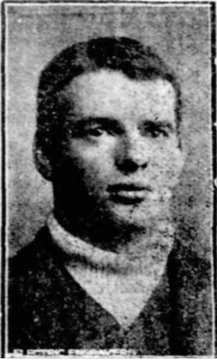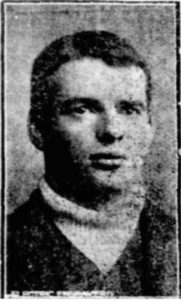by David McMillan
The remarkable life of Donald McLeod, a war hero, ended tragically at the bottom of a Pilbara mine shaft in December 1928.
Born in Dornoch, Scotland in 1887, he migrated to WA and worked as a miner in the State’s far north.
With the outbreak of World War I, he was among the first Western Australians to enlist, joining the 12th Battalion and training at Blackboy Hill. This battalion was made up of recruits from Tasmania, South Australia and Western Australia; the Western Australians joined the battalion in Egypt after sailing from Fremantle, whereas their interstate comrades had sailed from Albany.
The 12th Battalion took part in the inaugural landing at Gallipoli and the fighting climb up the slopes.
…and Cpl. Donald McLeod. The latter could always be seen doing the work of two men, keeping his men well under control, giving orders with his broad Scotch accent, and on all occasions personally leading his men with the full conviction that they were following him to a man.
— (Newton, L.M., The story of the twelfth: a record of the 12th Battalion, A.I.F. during the Great War of 1914-1918, Hobart, 1925)
Within four months, McLeod was promoted to Lieutenant but three days later, during the August offensives at the Battle of Lone Pine, his hand was blown off. Subsequently, his right arm was amputated and he was sent to London to recover.
But this was not the end of his war service. With an artificial arm attached, he succeeded in getting past the authorities and returned to his unit, now fighting in France, in June 1916. (In his AIF file in the National Archives, there are letters from fellow officers expressing their willingness to accept Lt McLeod as soon as he is passed by the Medical Board, which certified him as “physically able to carry out the duties required of an officer”.) Over the following two years of fighting, he was promoted to Captain, wounded in action again, gassed, mentioned in dispatches, and awarded the Military Cross.
Upon his return to Western Australia, he went north prospecting around Marble Bar, and discovered a reef which was called McLeod’s Reward. On this he sank, for the most part unaided, a shaft over 100ft. deep, a tremendous task for a one-armed man.
The West Australian reported in April 1920 that McLeod “literally single-handed, and without the aid of any artificial appliances, [had] raised 61 tons of ore which, on treatment at the Lalla Rookh battery, yielded over 64 ounces of gold.”
He sold the mine to a company, which erected a battery on it. Shortly afterwards, he moved to Perth where he engaged in business pursuits for some years. (At some stage, McLeod had married Georgina Morrison. Intriguingly, in his AIF file, his father’s listing, in Scotland, as next-of-kin has been crossed out and “Mrs G McLeod” with a London address entered. Perhaps he married her during the War. Perhaps she had remained in the UK and was the reason for his early enlistment. She died in Perth in 1988 and is memorialised at Fremantle Cemetery.)
Tragically on the evening of July 14, 1927, the car he was driving ran into and killed 20-year-old Mildred Ruby Walters as she alighted from a tram at the corner of Oxford and Richmond streets in Leederville.
The prosecution said the woman had been knocked down due to the careless manner in which the accused had handled his car. Having regard to the time and place, he had driven the car at excessive speed and had given no warning when he passed the stationary vehicle from which the deceased alighted.
A jury found McLeod had been negligent and he was convicted of manslaughter. The jury urged the judge to be lenient in his sentencing. He was jailed for three months “without hard labour”. Justice Draper said he agreed with the jury’s strong recommendation for mercy “but the public had to be protected”. Newspaper reports state that he was married with five children and earning his living as a traveler for the Blind Institution.
The accident unsettled him to such an extent that, upon release from gaol, he returned to the north to take up mining again. And it was at Soansville, near Marble Bar, that he met his end on December 4, 1928, when he fell down a 75ft asbestos mine shaft. He was only 40 when he died. His body was brought to the surface by one of his peers, Captain W. “Bill” Lynas, D.S.O., M.C of the 16th Battalion (who famously had landed as a private at Gallipoli and ended up commanding the unit at its last “stunt” on the Hindenburg Line).
Donald McLeon is buried in the Marble Bar Cemetery. A newspaper report states that Bill Lynas “attended to the last sad rites”. Donald McLeod is entered on the Western Australian War Memorial at Kings Park.





